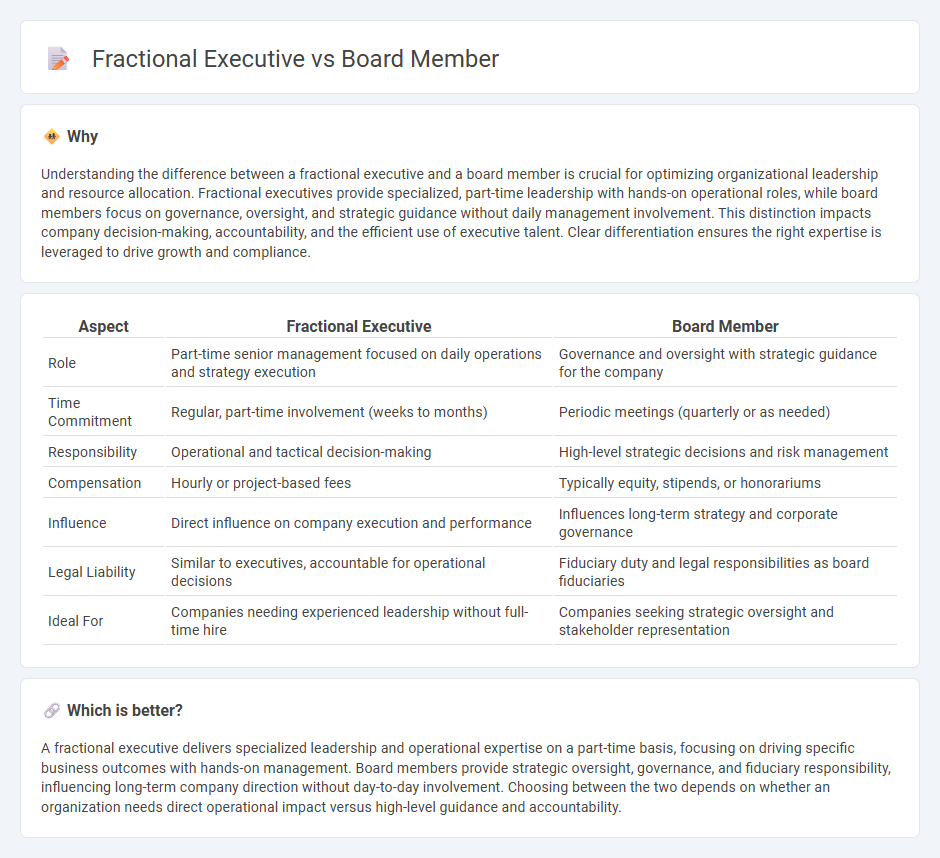
Fractional executives bring specialized leadership and operational expertise to companies on a flexible, part-time basis, optimizing costs and agility for growing businesses. Board members provide strategic oversight and governance, ensuring long-term sustainability and compliance through fiduciary responsibility. Explore how these distinct roles can drive success in your organization's employment strategy.
Why it is important
Understanding the difference between a fractional executive and a board member is crucial for optimizing organizational leadership and resource allocation. Fractional executives provide specialized, part-time leadership with hands-on operational roles, while board members focus on governance, oversight, and strategic guidance without daily management involvement. This distinction impacts company decision-making, accountability, and the efficient use of executive talent. Clear differentiation ensures the right expertise is leveraged to drive growth and compliance.
Comparison Table
| Aspect | Fractional Executive | Board Member |
|---|---|---|
| Role | Part-time senior management focused on daily operations and strategy execution | Governance and oversight with strategic guidance for the company |
| Time Commitment | Regular, part-time involvement (weeks to months) | Periodic meetings (quarterly or as needed) |
| Responsibility | Operational and tactical decision-making | High-level strategic decisions and risk management |
| Compensation | Hourly or project-based fees | Typically equity, stipends, or honorariums |
| Influence | Direct influence on company execution and performance | Influences long-term strategy and corporate governance |
| Legal Liability | Similar to executives, accountable for operational decisions | Fiduciary duty and legal responsibilities as board fiduciaries |
| Ideal For | Companies needing experienced leadership without full-time hire | Companies seeking strategic oversight and stakeholder representation |
Which is better?
A fractional executive delivers specialized leadership and operational expertise on a part-time basis, focusing on driving specific business outcomes with hands-on management. Board members provide strategic oversight, governance, and fiduciary responsibility, influencing long-term company direction without day-to-day involvement. Choosing between the two depends on whether an organization needs direct operational impact versus high-level guidance and accountability.
Connection
Fractional executives and board members share a strategic role in driving organizational growth by offering specialized expertise on a part-time basis. Fractional executives often bridge the gap between daily management and board directives, ensuring alignment with long-term goals. Their collaboration enhances governance and operational performance, benefiting both the company's leadership and stakeholders.
Key Terms
Governance (Board Member)
Board members provide strategic oversight and ensure organizational accountability by setting policies and monitoring performance, emphasizing governance frameworks that align with stakeholder interests. Fractional executives, while contributing operational expertise, focus primarily on managing day-to-day functions rather than governance responsibilities. Explore how board membership drives governance excellence to strengthen your organization's leadership structure.
Operational Leadership (Fractional Executive)
Operational leadership by a fractional executive offers hands-on management and strategic execution within a specific timeframe, optimizing company resources and driving growth without long-term commitment. A board member primarily provides governance, oversight, and high-level strategic advice without direct operational involvement. Explore how fractional executives can transform your business operations with flexible, expert leadership.
Fiduciary Duty (Board Member)
Board members hold a fiduciary duty to act in the best interest of the company, ensuring transparency, accountability, and adherence to legal obligations. Fractional executives, while providing strategic leadership and operational expertise part-time, do not carry the same legal responsibilities or fiduciary obligations as board members. Explore the key distinctions and implications of fiduciary duty between these roles to optimize your corporate governance.
Source and External Links
3 Types of Board Members (Plus 10 Types of Boards) | Indeed.com - A board member is an individual on a company's board of directors that serves as the organization's governing body, overseeing policies, management, and major decisions like hiring executives and setting goals.
Complete Guide To Board Member Responsibilities & Roles - Board members have distinct roles such as chairperson, who leads meetings, sets agendas, appoints committees, and holds members accountable in service of the organization's mission.
Board Member Roles and Responsibilities | BoardSource - Board members are expected to attend meetings, understand the organization's mission, serve on committees, advocate publicly, assist with financial oversight, and support leadership in governance tasks.
 dowidth.com
dowidth.com